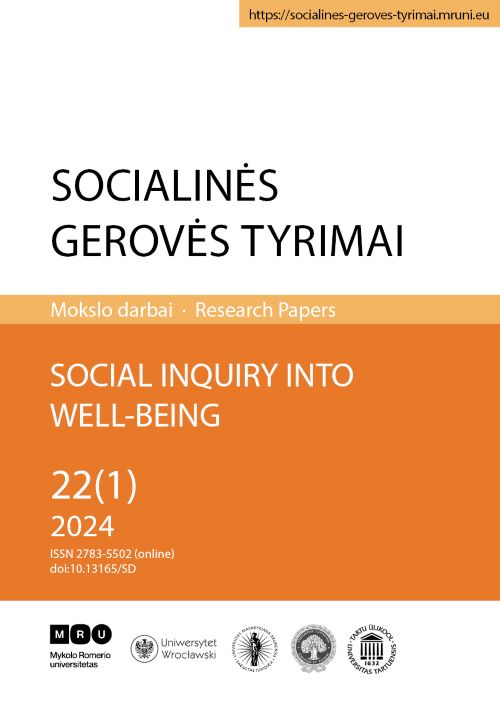THE DEVELOPMENT OF RESEARCH ON THE APPLICATION OF ICT IN THE FIELD OF EDUCATION: A META-ANALYSIS OF SCIENTIFIC PAPERS IN LITHUANIA
##plugins.themes.bootstrap3.article.main##
Abstract
This comprehensive analysis delves into the multifaceted evolution of research concerning information and communication technology (ICT) within the dynamic landscape of education. Embracing the meta-analysis methodology, this study embarks on a detailed journey through the corpus of scientific literature devoted to exploring the intricate interplay between ICT and education. Covering a substantial temporal span from 2002 to 2022, this investigation meticulously scrutinises and synthesises a wealth of scholarly contributions, illuminating diverse dimensions of the integration of ICT and its impact in educational settings. The overarching objective is to discern not only the methodological nuances, but also the transformative potential and broader trends that underscore the nexus of ICT and education. With a keen focus on Lithuanian scholarly output, this analysis seeks to unravel the intricate tapestry of research endeavours, shedding light on the methodological paradigms, thematic trajectories, and empirical insights that have shaped the discourse surrounding the role of ICT in education over the past decade. At its core, this study aims to address a constellation of probing questions that lie at the heart of contemporary educational discourse. How has the research methodology pertaining to the application of ICT in education evolved over time? In what specific domains and subdomains of education are the contours of the influence of ICT most discernible, and what emergent themes and focal points have garnered scholarly attention? Furthermore, what demographic cohorts and educational stakeholders emerge as primary subjects of inquiry, and how do researchers navigate the complexities of data collection and analysis in elucidating the nuanced dynamics of ICT integration in educational contexts? Through a judicious blend of quantitative and qualitative analyses, this study embarks on an ambitious journey to unravel the intricate threads of inquiry that animate the discourse surrounding ICT in education. By adopting a mixed-method meta-analytical framework, this investigation offers a panoramic vista that spans thematic, temporal, methodological, and demographic dimensions, thereby affording a nuanced understanding of the multifaceted landscape of the integration of ICT in education. In traversing this expansive terrain of inquiry, this study aspires not only to illuminate the contours of past research endeavours, but also to chart a course for future inquiry and innovation in harnessing the transformative potential of ICT to enrich and enhance educational practices and outcomes. After analysing Lithuanian scientific works related to the application of ICT in the field of education, it is evident that quantitative methodologies are most commonly chosen for empirical research on this topic, while qualitative methodologies are less prevalent. In articles employing quantitative methodologies, prevalent themes relating to ICT include: competency, application, possibilities and experiences, virtual learning environments, users of these environments, development in education, usage habits, attitudes towards ICT tool usage, augmented reality technologies, ICT as a component of learning environments, computer usage at home, and incentive-based encouragement using ICT tools. In articles employing qualitative methodologies, prevalent themes relating to ICT include: values education, opportunities, the internet, incentive-based encouragement, virtual learning environments, cloud computing, and experiences of using ICT in the teaching and learning process. Mixed-methodology articles commonly focus on the pedagogical foundations of educational environments, virtual experiments, the engagement of education participants, skills development, adult education, the personalisation of teaching and learning, e-learning, the educational environment, and increasing motivation. The most frequently studied subjects in these articles are teachers, followed by students, with other participant groups such as education experts and support specialists being less common. Systematising the data collection instruments used in the scientific articles analysed revealed that questionnaires predominated, with interviews being chosen less frequently, and other types of instruments being rare. An analysis of the essential conclusions of the examined scientific articles reveals that positive experiences of using ICT in the field of education are significantly more prevalent than negative experiences.
##plugins.themes.bootstrap3.article.details##
Mykolas Romeris University retains copyright ownership and publishing rights. Authors contributing to Social Inquiry into Well-Being agree to publish their articles under a Creative Commons Attribution 4.0 International Public (CC BY) License.![]()







